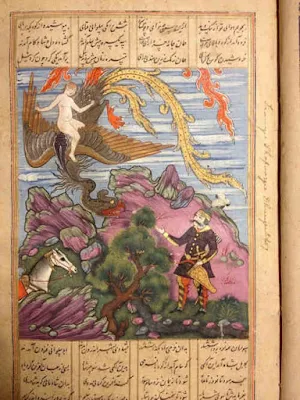Shahnama Rustam and Sohrab
Left: Zahhak-Hitler’s dream, in which the three warriors who will cause his demise appear – here depicted as Churchill, Stalin and Roosevelt. Right: Kaveh, the symbol of liberation for the Iranian people, coming before Zahhak-Hitler and raising his blacksmith’s apron as a banner of rebellion
A battle scene from the Baysonghori Shahnameh
Bahram, son of Siavash, plotted to kill Bahram Chubineh
while playing polo. However, his wicked wife, herself in love with Bahram
Chubineh, betrayed her husband, warning Bahram Chubineh that he would be
wearing mail under his clothes. Alerted, Bahram Chubineh tapped all the players
as he approached them and when he discovered Bahram, he cut him in half with
his scimitar.
Courtiers of Baysonghori playing chess
Faramarz, son of Rostam, mourns the death of his father, and of his uncle, Zavareh.
Georgian manuscript of Shahnameh written in the Georgian script.
In old age Rustam’s half brother Shag Has plotted his death.
He had pits dug and filled them with spears and sharp swords before covering
them over. Spurred on by Rustam, Rakhsh and his rider fell into the trap.
Rustam’s dying wish to the treacherous Shahad was to be handed his bow with
two arrows. Granted, he strung it one final time, killing Shahad who had taken
refuge behind a tree
Kai Khorso enthroned holding the sword with which he will execute Afrasiyab for the murder of Siavash
Page from a manuscript of the Shahnama of Firdawsi (d. 1020)
Rustam kills the Turanian hero Alkus with his lance
Rustam son of the hero Zal
Scenes from the Shahnameh carved into reliefs at Ferdowsi's mausoleum in Tus, Iran
Shahnameh (Book of Kings) Abu'l Qasim Firdausi (935–1020)
The albino Zal, son of the hero Sam, abandoned at birth in
the mountains, was rescued and brought up by the magical Simurgh bird.
Subsequently regretting his actions, Sam set off to find his son. Mindful of
Zal’s future destiny, the Simurgh reluctantly returned him to his father,
leaving him with magical feathers by which he could summon the Simurgh’s help
at a time of need. The margin of this unsigned miniature dating from ca. 1640
contains the signature of a previous owner Framjee Shapoorjee Dhunjibhoy dated
1874. Rustam son of the hero Zal, engaged in a quest to liberate king Kavus
from the demons of Mazandaran, undertook seven trials. In the third, Rustam,
asleep, was approached by a monstrous dragon. Twice woken by his horse Rakhsh,
in the darkness of the night he failed to see any danger and went back to
sleep. Woken a third time, however, Rustam finally saw the dragon and with
Rakhsh’s help succeeded in killing him. The painting is signed by Muhammad
Yusuf
the arrival of the promised warriors,
The assassination of Khosrau II in a manuscript of the Shahnameh of Shah Tahmasp made by Abd al-Samad in 1535
The hero Bizhan, on a hunting trip, ended up joining in an
outdoor feast with Manizheh, daughter of Afrasiyab, the arch enemy of Iran.
When the festivities finished, Manizha drugged Bizhan, took him home with her
and hid him in the women's quarters. On discovery, he was spared death, but was
instead imprisoned in a pit with only the disgraced Manizha to minister to
him. She enlisted Rustam’s help to move the giant rock and free Bizhan with his
lasso.
The romance of Khusraw Parviz and Shirin Khusrau Parviz had loved Shirin in his youth but gave her up when he became king. Meeting years later, he fell in love with her again and took her home and married her.
The Shahnama of Firdausi, Gilan, Iran, British Museum. This miniature shows the presence of the Chinese dragon motif as a furniture decoration in the miniature even before the Shahnama of Shah Tahmasp
The-Shahnama-of-Shah-Tahmasp-The-picture-shows-Piran-and-the-Khaqan-of-China-Museum-of
Unknown to Rustam, princess Tahminah of Samangan gave birth
to his son Sohrab. Years later Sohrab and Rostam met on opposite sides in the
battlefield, both unaware of their relationship. Rustam mortally wounded Suhrab
with a dagger only to recognise, too late, the clasp that he had given Tahminah
after their night of passion. Signed by Muhammad Yusuf.
Zahhak enthroned, with serpents rising from his shoulders. From a provincial Timurid Shahnameh from Mazandaran dated 850 1446


























No comments:
Post a Comment